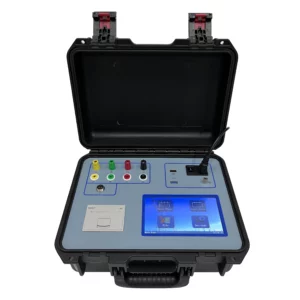Capacitance Inductance Testers, also known as LCR meters, are versatile instruments commonly used in electronics and electrical engineering for a variety of applications.
Some typical applications of LCR meters include:
- Component Characterization: LCR meters are used to characterize and measure passive electronic components such as capacitors, inductors, resistors, and transformers. This includes measuring capacitance, inductance, resistance, and impedance values.
- Quality Control and Testing: They are employed in manufacturing and quality control processes to ensure that electronic components meet specifications and quality standards. LCR meters can identify faulty or out-of-spec components.
- Component Selection: Engineers use LCR meters to select components that match desired specifications for impedance, frequency response, or other electrical properties.
- Circuit Design and Prototyping: LCR meters assist in designing and prototyping electronic circuits by accurately measuring the properties of components needed for circuit design, filter design, and impedance matching.
- Filter Design: Engineers use LCR meters to design and test filters for specific applications, including low-pass, high-pass, band-pass, and band-stop filters.
- Antenna Design: In RF (radio frequency) and microwave applications, LCR meters help design and optimize antennas and transmission line components, ensuring impedance matching.
- Frequency Response Analysis: LCR meters are used to analyze the frequency response of circuits and components, making them valuable for audio and RF applications.
- Material Characterization: In materials science and research, LCR meters can be used to measure the dielectric properties of materials, such as permittivity and loss tangent.
- Impedance Matching: LCR meters are crucial for impedance matching in RF and microwave systems to ensure maximum power transfer and minimal reflection.
- Troubleshooting and Fault Detection: When diagnosing problems in circuits, LCR meters can help identify faulty components, open circuits, short circuits, or mismatches.
- Educational and Research: LCR meters are used in educational institutions and research laboratories for teaching and experimental purposes.
- Testing Transformers: LCR meters are employed to test and verify the performance of transformers and to determine parameters like turns ratio, inductance, and quality factor.
- Passive Component Testing: LCR meters can measure parameters like the equivalent series resistance (ESR) in capacitors, which is important in power electronics and audio applications.
Overall, LCR meters play a crucial role in various stages of electronics and electrical engineering, from component selection and circuit design to manufacturing and troubleshooting, helping engineers and technicians ensure the reliability and performance of electronic systems.
What are the factors to consider when selecting the right LCR meter for a specific testing application or industry?
When selecting the right LCR meter for a specific testing application or industry, there are several factors to consider to ensure that the instrument meets your needs and requirements.
Here are some important factors to keep in mind:
- Measurement Parameters: Determine the specific parameters you need to measure, such as capacitance, inductance, resistance, impedance, and other relevant electrical properties. Ensure the LCR meter you choose can handle these parameters.
- Measurement Range: Consider the range of values you need to measure. Choose an LCR meter with an appropriate measurement range for your components and applications.
- Frequency Range: LCR meters operate at different frequencies. Select an LCR meter with a frequency range suitable for your testing needs. Low-frequency meters are ideal for passive components, Capacitance Inductance Tester while high-frequency meters are needed for RF and microwave applications.
- Accuracy and Precision: Evaluate the accuracy and precision of the LCR meter, especially if you require highly accurate measurements. Look for specifications regarding measurement accuracy and resolution.
- Test Speed: Depending on your application, you may need a fast LCR meter for high-throughput testing or a more precise meter for detailed analysis. Consider the required test speed for your specific application.
- Test Fixture and Probes: The type of test fixture and probes provided with the LCR meter is important. Ensure they are suitable for your components and applications. Some LCR meters offer different fixture options.
- Connectivity and Data Logging: Check if the LCR meter provides connectivity options like USB, LAN, or Bluetooth for data transfer and remote control. Data logging capabilities can also be useful for long-term testing.
- Display and User Interface: Evaluate the ease of use and clarity of the LCR meter’s display and user interface. A user-friendly interface can make testing more efficient.
- Software and Compatibility: Check if the LCR meter comes with compatible software for data analysis and reporting. Ensure that the software is compatible with your operating system.
- Environmental Conditions: Consider the environmental conditions in which the LCR meter will be used. Some applications may require LCR meters with special environmental protection features, such as moisture resistance.
- Calibration and Maintenance: Determine the ease of calibration and maintenance of the LCR meter. Calibration standards and procedures should be readily available.
- Budget: Consider your budget constraints and select an LCR meter that offers the best balance between features and cost for your specific needs.
- Industry and Application Specifics: Some industries, such as aerospace, automotive, or RF/microwave, may have specific requirements. Ensure that the LCR meter you choose meets any industry-specific standards.
- Warranty and Support: Check the warranty and customer support options provided by the manufacturer to ensure you have access to assistance if issues arise.
By carefully considering these factors, you can choose the right LCR meter that best matches your specific testing requirements and industry standards. It’s essential to thoroughly research and compare different LCR meters before making a selection.
